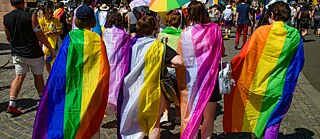Many German cities are today proud of their vibrant queer community. There are bars, clubs, events and initiatives that offer queer people a safe space. The ways to get there were very different.
On 28 June 1969, during the Stonewall Uprising on Christopher Street in New York, Latinas and black people in particular fought back against recurring police harassment in bars with a homosexual and trans clientele. This event was a turning point for the LGBTQ+ movement worldwide in the fight for equal treatment and recognition. It showed that safety, freedom and safe spaces cannot be taken for granted and that one must fight for them with all possible effort.A lot has changed since then. Germany is one of the ten most LGBTQ+ friendly countries in Europe, and the situation has even improved in recent years. This is documented by the “Rainbow Map” published annually by the organisation Ilga-Europe.
Cologne
Cologne is the queer centre of Germany. The best example: the annual Christopher Street Day (CSD) reliably attracts more than 950,000 people to the North Rhine-Westphalian cathedral city. According to a study commissioned by the city in 2019, 10.6 per cent of Cologne residents identify as lesbian, gay, bisexual, transgender or intersex, i.e. as part of the LGBTQ+ community. This figure is also significantly higher than the national average (6.9 per cent). Unlike other cities, Cologne does not have a large club culture. The LGBTQ+ community is older and more established here, and queerness has always existed in the city on the Rhine, which is particularly affecting for the many annual CSD visitors.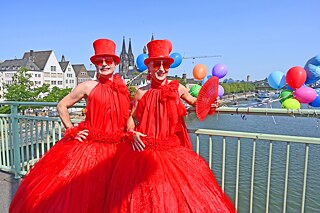
Christopher Street Day (CSD) in Cologne – demonstration in favour of greater social acceptance and legal equality for gays, lesbians, transgender and bisexual people | Photo (detail): © picture alliance/dpa | Horst Galuschka
Berlin
In most travel guides and online forums, the German capital is considered one of the most LGBTQ+-friendly cities in Europe. Not without reason: the queer identity of the metropolis dates back to the Weimar Republic and is still openly practised today. In addition to the CSD, there are numerous other relevant city and park festivals, parades and demonstrations. The cinemas, bars and clubs, especially around Nollendorfplatz in Berlin's Schöneberg district, invite a wide audience to queer events. The so-called Tuntenhaus, an alternative housing project in Prenzlauer Berg, was saved from being sold to an investor thanks to the efforts of the residents and the borough. Queerness can also be found in local public transport: since the end of 2020, trans voice actress Philippa Jarke has been announcing the individual stops.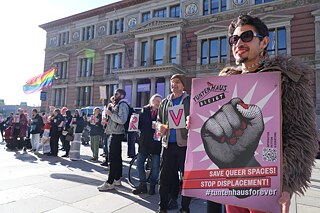
Protest in front of the Berlin House of Representatives for the preservation of the queer housing project “Tuntenhaus” | Photo (Detail): © picture alliance/dpa | Soeren Stache
Hamburg
Hamburg also has a lively LGBTQ+ scene. The St. Georg district is known for its queer bars and clubs. The famous Reeperbahn nightlife area is home to the drag queen Olivia Jones, who is known throughout Germany. The FC. St. Pauli, with its stadium right on the Reeperbahn, has welcomed queer people to the club for years and is constantly fighting for more visibility for the LGBTQ+ community in sport. It's no wonder that many queer people feel at home in the northern German Hanseatic city and drop anchor here.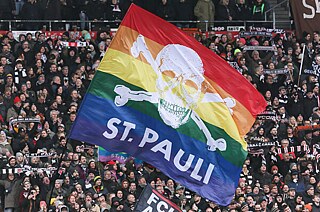
St. Pauli fans with rainbow flag at the Millerntor stadium near Hamburg's Reeperbahn in February 2024 | Photo (detail): © picture alliance / Selim Sudheimer | Selim Sudheimer
Leipzig
The CSD is not only celebrated in major cities in western Germany, people are also trying to make sexual diversity visible everywhere else in the country – for example in Erfurt, Zwickau, Magdeburg and Jena. The queer groups there are often fighting against right-wing extremist forces and can only organise their parades with the help of donations. Leipzig is the place of longing for many queer people in eastern Germany. The CSD there is the largest Pride event in the region and attracts thousands of people every year. Leipzig has also developed into an LGBTQ+-friendly city over the years, especially in the alternative neighbourhood of Connewitz.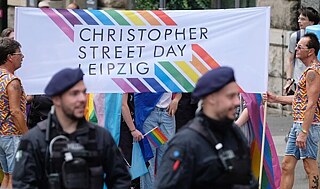
Leipzig, summer 2022: CSD participants are escorted by the police in the city centre | Photo (detail): © picture alliance/dpa | Sebastian Willnow
Munich
Around 40 years ago, Munich was a metropolis for the LGBTQ+ community. Even the star and singer of the group Queen Freddy Mercury lived in Munich for a few years and was a regular guest in the bars and discos in the then down-at-heel Glockenbach district. The memory of this time can still be felt in some corners of the city and there are still cultural spaces and offers. But Munich's queer-friendliness is coming under significant pressure from conservative forces in Bavaria. Drag shows are being attacked, gender stars are being banned and former trendy pubs are being closed. However, none of this stops the queer community from organising a CSD, which is always well attended. For the younger generation, however, another city in southern Germany has become the LGBTQ+ friendly centre: Stuttgart.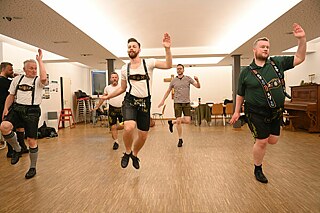
Training of the queer Schuhplattler “D' Schwuhplattler” in Munich | Photo (detail): © picture alliance / SZ Photo | Stephan Rumpf
June 2024
